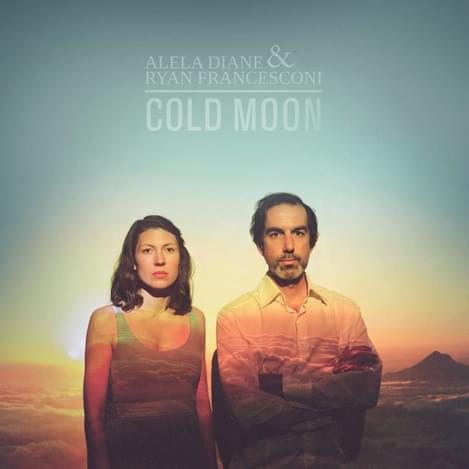Alela Diane and Ryan Francesconi look for silver linings
"Cold Moon"

Diane and her fellow Portlander Ryan Francesconi conceived Cold Moon at a show in October 2014, and composed it over the course of the Pacific Northwest winter, a season that is ingrained in the bones of these songs. Cold Moon is the first full-length new release from Diane since 2013's About Farewell, a record she described as a "divorce album". In the time that's passed, she's remarried and become a mother. By her own confession Diane is a writer whose songs are fuelled by happenstance, and a period of relative stability in her life augured a period of artistic stagnation. Collaboration with Francesconi, whose previous biggest credit was his work arranging Joanna Newsom's Have One on Me, was intended as a way for both artists to emerge from creative standstills.
Francesconi’s Balkan-influenced compositions are sparse and fragile and autumnal. Sometimes he simply picks out and echoes Diane’s vocal melody; there is a moment on “Migration” when she starts to sing along to his arpeggio, sounding like a spontaneous improvisation, which might be the case given the way this collaboration came together. Mostly Francesconi's instrumentation is deliberately unobtrusive, doing just enough to underpin and never overshadow Diane’s voice. Occasionally it is barely there at all.
Francesconi cites Béla Bartók as a crucial part of his musical education, and his arrangements share an ambiguity of mood with the Hungarian’s best pieces, which means Diane’s lyrics are not straitjacketed into a particular interpretation by the music. Her words are obsessed with weather and seasons, all fading light and changing tides; they're frequently bleak, ruminating on death and loss and the passage of time, but they are never singularly so, never a grey cloud without a ray of light. For all the darkness, “we never tire of the changing of the seasons,” Diane sings on the gentle “Quiet Corner”. Winter and despair cannot be irredeemably bound together without invoking their counterpoints, the inevitability of change, of return and rebirth. “There is blue above the clouds, even on the darkest day,” the title track reminds us. Francesconi’s playing catches in these ambiguous spaces, his sense of tone echoing Diane’s sentiments.
Francesconi’s Newsom connection is perhaps unfortunate. Being the pre-eminent peddler of delicate wintry-folk of the past decade or so, it is unsurprising that comparisons with Newsom have haunted Diane most of her career (the two are friends and both grew up in Nevada City, California). To confess the inconfessable, I’ve never been totally sold on Newsom, but even to me it is clear that Diane is never going to come out of these comparisons favourably. She is almost entirely lacking in the theatrical bombast that is Newsom’s USP and while, superficially, there are other acts who sound similar to Diane, there is still very little else that could readily be confused for Newsom's "Monkey and Bear".
Where Newsom invests in narrative flights of fancy and fantasy, Diane is rooted in the real. Though there is something fantastical about her descriptions of the Oregon winter landscape — “city lights do shine / stars are lost in sight / reflections of the light / from buildings and machines” — it is constantly tempered with reminders of the engulfing, encompassing passage of time, reminders that “we can’t hold back the night.” The next track, “Shift”, hinges around the repeating phrase “rise, fall / in, out”. It isn’t anchored to anything in particular, cropping up several times in the song as a quasi-chorus. Rise, fall, in, out is the album’s four-word summary, it’s thematic centre.
I began trying to write this review in Madrid, where even in early October the temperature was somewhere in the mid-20s and where Cold Moon didn’t make much sense. Back in London, where the mid-October temperatures are dropping by the day, Cold Moon managed to lock perfectly into that strange sense of passing and the end of something that the shorter days, the turning leaves, the pervasive cold instills in my mind. Cold Moon is an winter morning. Not a dark, brittle winter morning, but a happily futile winter Sunday morning, where the a few snatched hours of watercolor sunlight feel all the more precious for their scarcity. If Diane’s About Farewell was indeed about farewell, Cold Moon is about the knowledge that while “we can’t hold back the dark”, the light will come around again anyway. It is not by coincidence that the album's closing words are "goodbye, goodbye", and it is no accident that this is among the album's most uplifting, affirming moments.
Get the Best Fit take on the week in music direct to your inbox every Friday

Great Grandpa
Patience, Moonbeam

Deafheaven
Lonely People With Power

Perfume Genius
Glory





